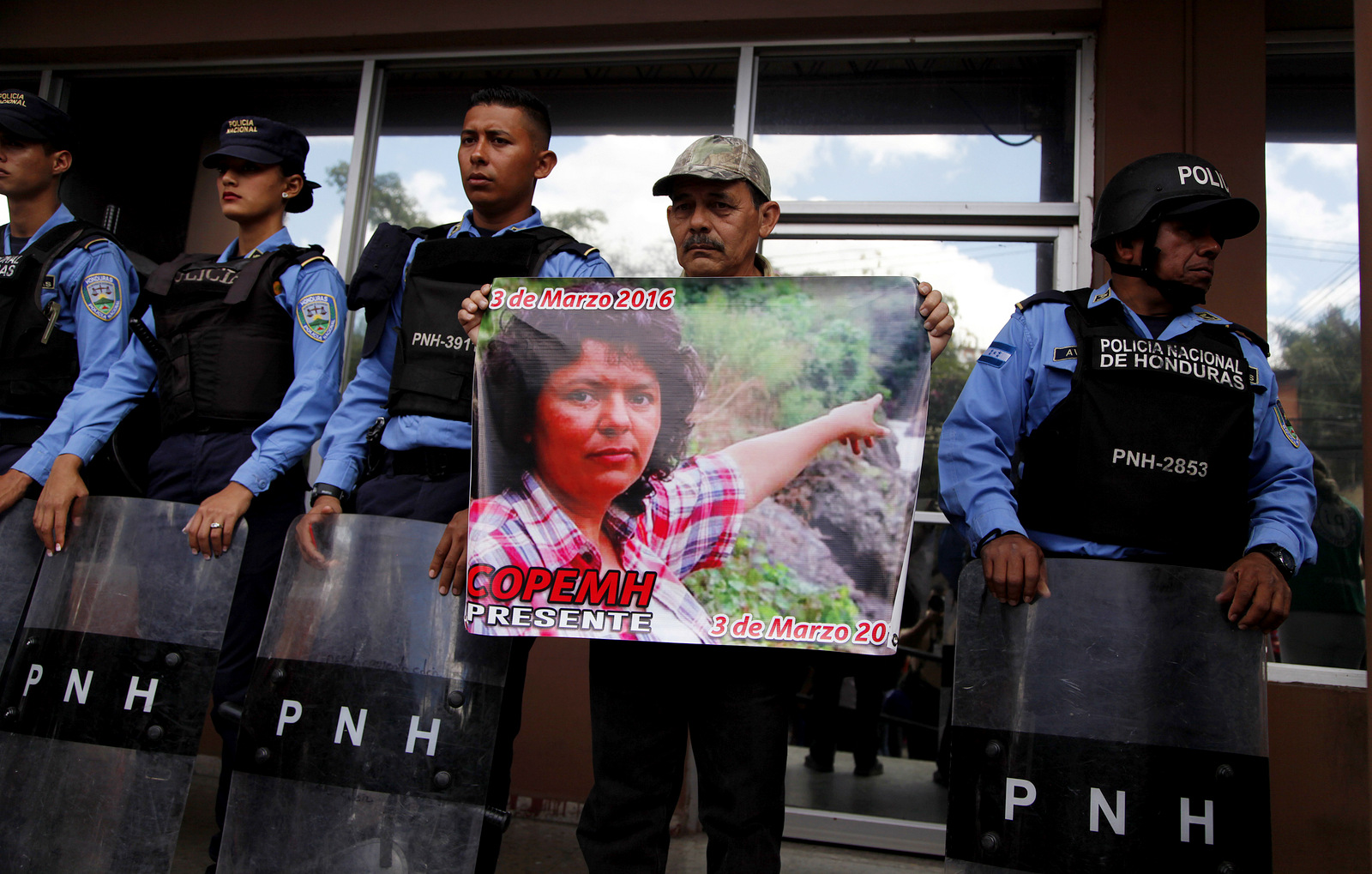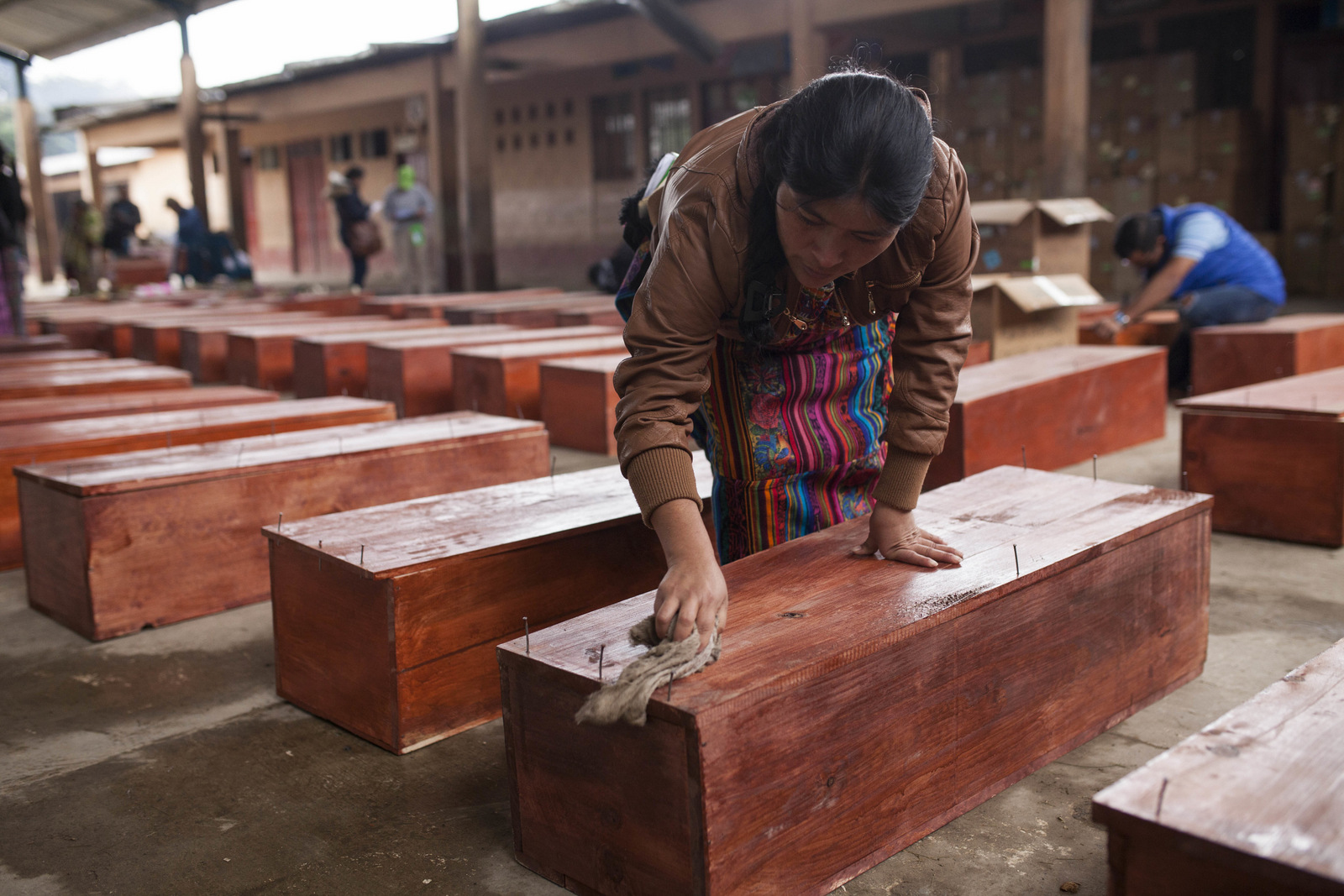TEGUCIGALPA, HONDURAS — Late on the evening of June 28, 2009, two days before voters were scheduled to go to the polls to vote on a referendum amending the Honduran Constitution, army officers forced President Manuel Zelaya — wearing only his pajamas and slippers — to board a military airplane for Costa Rica. Three months later, after the deposed president had returned surreptitiously to this capital city and holed up in the Brazilian embassy, police opened fire on thousands of his supporters who had assembled outside the mission to demand the cancellation of the November presidential elections.
A teacher and union activist, Agustina Flores had gone to fetch coffee when the shooting began. Just as she returned, she was cornered by police officers who punched and beat her with batons, then took her and hundreds of others to a nearby soccer field that had been converted into a makeshift jail. Flores told the Guardian newspaper in 2016:
The police and soldiers were firing rubber and live bullets into the crowd, beating women and the elderly. One [tear gas] grenade exploded near me; after that I blacked out.”
Continuing, she said:
They hit my face, neck and body. We were trying to defend the constitution and the democratic process.”
But the tens of thousands of Hondurans who poured into the streets in support of Zelaya quickly discovered that they had powerful political enemies both at home and abroad. Rather than condemn the coup, President Obama’s then-Secretary of State, Hillary Clinton, refused to even use the term and instead pressured Honduras’ neighbors to recognize the new government and proceed with the scheduled elections. The ensuing legitimization of the coup government ushered in an era of state repression, violence, and pro-business policies that have delivered at the United States’ doorstep a flood of asylum-seekers from this impoverished Central American country, which was the murder capital of the world as recently as 2011.
Hard choices?
In her autobiography Hard Choices, Clinton wrote:
We strategized on a plan to restore order in Honduras and ensure that free and fair elections could be held quickly and legitimately, which would render the question of Zelaya moot and give the Honduran people a chance to choose their own future”
In a 2014 interview, the indigenous-rights and environmental activist Berta Caceres described Clinton’s diplomacy in Honduras as a kind of “counterinsurgency” intended to aid and abet “international capital” in its efforts to extract resources from an adversarial population. Said Caceres:
We warned that this would be very dangerous. The elections took place under intense militarism and enormous fraud.”

A man, flanked by police, holds a placard showing an image of slain activist Berta Caceres, during a protest demanding justice for her murder, outside the Prosector’s Office in Tegucigalpa, Honduras, March 2, 2018. Fernando Antonio | AP
Describing the impact of the government’s crackdown on dissident, she said in another interview:
Every day, people are killed.”
Caceres was herself murdered only days later, gunned down by a team of assassins with ties to a hydroelectric dam opposed by the country’s indigenous community.
Alex Main, an expert on U.S. policy in Central America at the Center for Economic and Policy Research, told The Nation magazine:
With the coup, Clinton had a real opportunity to do the right thing and shift U.S. policy to respect democratic processes. But she completely messed it up, and we’re seeing the consequences of it now.”
Fleeing to the country that ruined their countries
As of late, the Washington press corps and lawmakers from both sides of the aisle have, understandably, expressed their unique loathing of the Trump White House’s mistreatment of undocumented Central American immigrants filing for political asylum in the U.S. But what typically goes unmentioned in the public debate is the role that both Democratic and Republican administrations have played in creating the volatile situations on the ground that force Hondurans, Guatemalans, Salvadorans and other Latino refugees to flee in the first place.
It’s important to contextualize the Americas historically as a battle between the mostly European settlers who own the New World and the mostly indigenous and black workers who built it. Destabilizing Central America allows multinationals to continue to exploit labor and resources, and dates back to the CIA’s 1954 plot to overthrow the democratically elected government of Guatemala’s Socialist President Jacobo Arbenz, whose plan to redistribute land to the country’s landless peasant farmers threatened the massive holdings of the United Fruit Company, the predecessor of Chiquita Brands. The coup eventually triggered a civil war between leftist rebels and the U.S.-backed military, led by avid anti-Communist generals.
In an attempt to pressure Guatemala’s government to cease its human-rights abuses, President Jimmy Carter banned all Defense Department sales of military equipment to Guatemala in 1978, followed by a ban of commercial sales in 1980. Shipments previously approved continued, however, and so did the indiscriminate slaughter of civilians, disproportionately members of the indigenous Mayan tribe. Ronald Reagan lifted the sanctions in 1981; the war escalated and, by the time it ended 15 years later, nearly 200,000 Guatemalans had been killed.

An Ixil Mayan woman cleans a coffin holding the remains of a civil war victim prior to a mass burial in Santa Avelina, Guatemala, Nov. 30, 2017. After seven years of work by forensic anthropologists, including DNA tests to locate relatives, the remains of 172 indigenous Ixil Mayans killed during the civil war between 1978 and 1982 were buried in the western mountains of Guatemala. Moises Castillo | AP
U.S. Representative Beto O’Rourke, a Democrat from El Paso, Texas, told the Huffington Post:
It set a pattern. You look at the decades following [the coup], and the military strongmen, and the juntas, and the mass killings, and it’s no wonder Guatemala is in such terrible shape today.”
Fearing the spread of communism, Carter also supported the decades-long war against El Salvador’s leftists guerillas, known by the Spanish acronym FMLN, which cost an estimated 75,000 lives, ruined the country’s infrastructure, and displaced one-fifth of the population.
Experts note that Nicaraguans are not among the hordes of Central Americans trying to enter the U.S. today — at least not in any significant numbers — and attribute their absence to the success of the leftist Sandinista movement in combating U.S. efforts to install a puppet regime. The country is beginning to experience some political unrest today but, for the most part, President Daniel Ortega’s Sandinista movement — which took power in 1979 and managed to hold off the U.S.-backed Contras at the polls for a decade, before regaining power — remains alive and well.
President Daniel Ortega’s Sandinista movement — which took power in 1979 and managed to hold off the U.S.-backed Contras at the polls for a decade, before regaining power — remains alive and well.
Greg Grandin, a professor of Latin American history at New York University, told the Huffington Post:
You see the direct effects of these Cold War policies. Nicaragua doesn’t really have a gang problem, and researchers have traced this back to the 1980s and U.S. Cold War policy.”
Said O’Rourke:
Just on basic humanitarian grounds we should do the right thing by these kids and accept them as refugees — or the legal term is ‘asylum seekers’ — but we also own this problem, we have culpability in it, whether it’s our involvement with thuggish governments there in the past, or whether it’s the fact we are the world’s largest consumer of illegal drugs that are transited through these countries, or whether it’s the war on drugs that we’ve foisted upon these countries.
All of those things contribute to the destabilization, the insecurity, the failed governance, the lack of civil-society development. So, one, we should help now that we’ve done so much to create this situation and, two, we should work constructively with regional partners to rebuild these societies to the best that we can.”
Top Photo | Family members wait outside the Air Force Base for the arrival of their relatives, who were deported from the United States, in Guatemala City, June 20, 2018. Luis Soto | AP
Jon Jeter is a published book author and two-time Pulitzer Prize finalist with more than 20 years of journalistic experience. He is a former Washington Post bureau chief and award-winning foreign correspondent on two continents, as well as a former radio and television producer for Chicago Public Media’s “This American Life.”
The post The US Ruined Their Countries, Now Trump Calls Them “Animals” and Sends Them Back appeared first on MintPress News.
